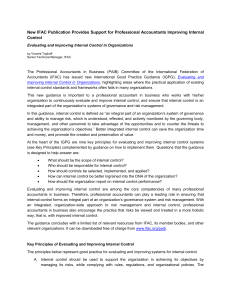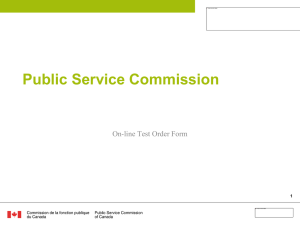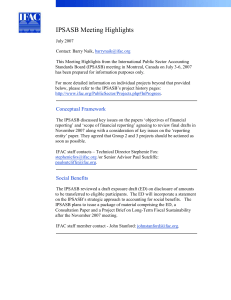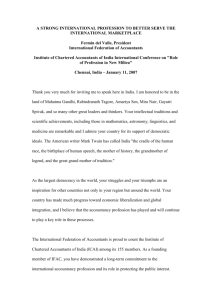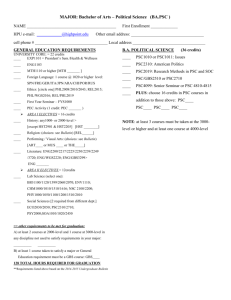1 THE BEGINNING OF INTERNATIONAL PUBLIC ACCOUNTING
advertisement
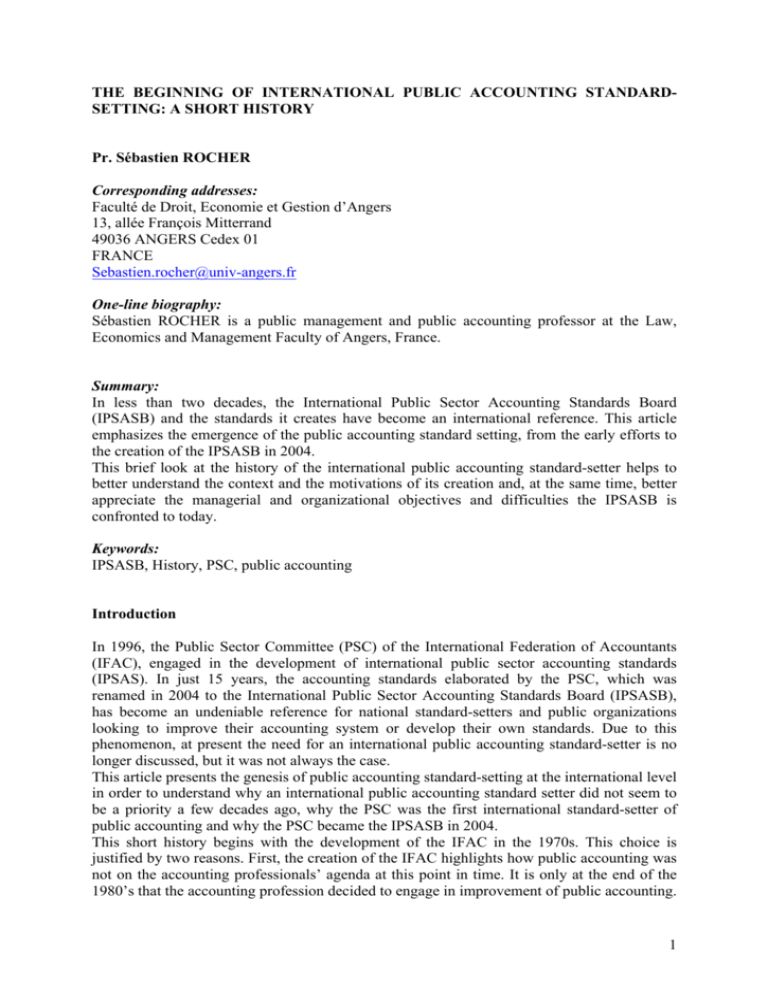
THE BEGINNING OF INTERNATIONAL PUBLIC ACCOUNTING STANDARDSETTING: A SHORT HISTORY Pr. Sébastien ROCHER Corresponding addresses: Faculté de Droit, Economie et Gestion d’Angers 13, allée François Mitterrand 49036 ANGERS Cedex 01 FRANCE Sebastien.rocher@univ-angers.fr One-line biography: Sébastien ROCHER is a public management and public accounting professor at the Law, Economics and Management Faculty of Angers, France. Summary: In less than two decades, the International Public Sector Accounting Standards Board (IPSASB) and the standards it creates have become an international reference. This article emphasizes the emergence of the public accounting standard setting, from the early efforts to the creation of the IPSASB in 2004. This brief look at the history of the international public accounting standard-setter helps to better understand the context and the motivations of its creation and, at the same time, better appreciate the managerial and organizational objectives and difficulties the IPSASB is confronted to today. Keywords: IPSASB, History, PSC, public accounting Introduction In 1996, the Public Sector Committee (PSC) of the International Federation of Accountants (IFAC), engaged in the development of international public sector accounting standards (IPSAS). In just 15 years, the accounting standards elaborated by the PSC, which was renamed in 2004 to the International Public Sector Accounting Standards Board (IPSASB), has become an undeniable reference for national standard-setters and public organizations looking to improve their accounting system or develop their own standards. Due to this phenomenon, at present the need for an international public accounting standard-setter is no longer discussed, but it was not always the case. This article presents the genesis of public accounting standard-setting at the international level in order to understand why an international public accounting standard setter did not seem to be a priority a few decades ago, why the PSC was the first international standard-setter of public accounting and why the PSC became the IPSASB in 2004. This short history begins with the development of the IFAC in the 1970s. This choice is justified by two reasons. First, the creation of the IFAC highlights how public accounting was not on the accounting professionals’ agenda at this point in time. It is only at the end of the 1980’s that the accounting profession decided to engage in improvement of public accounting. 1 Second, it is the IFAC which created, in 1986 a committee dedicated to conceptual questions raised by public accounting and motivated by the acceleration of accrual accounting diffusion in the public sector. This article emphasizes this trajectory, from the first steps of the development of the IFAC, to the creation of the PSC in 1986, which became the IPSASB in 2004. 1 - 1962 - 1977: How the IFAC could have been the International Institute of Public Accounting During the 1962 international congress of accountants which was held in New York, the idea to develop an international authority whose role would be to take part in the development of accounting in countries where this practice was underdeveloped, emerged. Thus, according to Carey (1965, p. 103; quoted by Camfferman and Zeff, 2007, p .37) “It has also been suggested that an international information center be established by the professional accounting organizations of the world, with a full-time secretariat charged with the duty of distributing professional publications and disseminating technical information on an international scale. Such an international center might also offer guidance to newly developing professional societies in countries where a well organized profession does not yet exist”. Five years later, during the international congress of accountants in Paris in September 1967, this idea was reinforced (Dye, 1988, p. 13; Camfferman and Zeff, 2007, p. 37). Thus, Cowan (1967, p. 376) evoked the possible creation of an “International Office for Research, Information and Accounting Cooperation”. He considered such an institution as essential to progress towards international harmonization of accounting principles. H. Ross, a Canadian chartered accountant also shared this point of view (Ross, 1967, p. 378). According to him, a permanent organization was needed because accounting harmonization could not be satisfactory with only quinquennial or even annual congresses. The President of the Congress, François-Maurice Richard, also supported this idea. He proposed the adoption of a resolution creating an international secretariat by the representatives of the various institutions participating to the congress (Camfferman and Zeff, 2007). However, because of oppositions to this idea formulated by representatives of Great Britain, the United States of America and the Netherlands, it was decided to constitute a working group only (the International Working Party, IWP) in order to study the possibility of creating a secretariat and to defer this proposal to the next international congress (Camfferman and Zeff, 2007; Bocqueraz and Walton, 2006). In October 1972, during the international congress of accountants in Sydney, the British opposition led the IWP to conclude that it was premature to create an international secretariat. The IWP was thus left alone 5 more years to think about this problem. It was however decided to change the name of this work group, which became the International Coordination Committee for the Accountancy Profession (ICCAP) (Dye, 1988; Camfferman and Zeff, 2007; Humphrey and Loft, 2007b). In accordance with Cowperthwaite1 (1977, p. 17), the creation of the ICCAP came from the extreme urgency to create a worldwide organization in order to treat the international accounting problems concerning international commercial relations, and also a major desire to strengthen the co-operation between the numerous professional organizations. Thus, the objective of the ICCAP was the creation of an accounting profession coordinated with uniform standards (Cowperthwaite, 1977). In January 1973, at the instigation of the American Institute of Certified Public Accountants (AICPA), a proposal was made to transform the ICCAP into the “International Institute of 1 Who was the IFAC President from 1980 to 1982 (IFAC, 2007). 2 Public Accounting”. One of the goals of this organization would be to establish international standards of accounting and auditing. If this proposal received the support of various countries, the opposition in Great Britain drove to rule out this possibility2 (Bocqueraz and Walton, 2006, p. 283). Of course, throughout this proposition, it was more a question of insisting on the public dimension of accounting standards that such an organization would have diffused, rather than the creation of an organization in charge of public accounting standard-setting, which was not pressing at that time. Thus, it seems that there is no ambiguity at the time about such a name, as could be the case today. Still, an organization named “International Institute of Public Accounting” could easily have extended its field of competence and engaged in the elaboration of public accounting standards. Following the proposition of the ICCAP, the IFAC was created on October 7th, 1977, during the 11th international congress of accountants in Munich. (Cummings and Chetkovich, 1978; Mueller, 1979; Dye, 1988; Humphrey and Loft, 2007a, 2007b). The original constitution of the IFAC presented, in its second paragraph, that the role of the IFAC was the development and enhancement of a co-ordinated worldwide accounting profession with harmonized standards (Dye, 1988, p. 14; Humphrey et al., 2004, p. 9). To reach these goals, the IFAC created, in October 1977, four committees in order to develop international standards and application guides, namely: 1. The International Auditing Practices Committee (today the International Auditing and Assurance Standards Board); 2. The Education Committee (now known as the International Accounting Education Standards Board); 3. The Ethics Committee (which became the International Ethics Standards Board for Accountants); 4. The Management Accounting Committee (known currently as the Professional Accountants in Business Committee). At that time, the idea of an international authority specific to the public sector is not considered. It wasn’t until June 1986 that the IFAC created a fifth committee dedicated to the public sector: the Public Sector Committee. 2 - 1986: The PSC creation According to Dye3 (1988), the idea of creating the PSC was driven on the one hand, by the fact that not much financial data existed for governmental organizations which represented billions of dollars - entities generally financed by debt, and on the other hand, by the increasing needs for better financial accountability of governments with their ever extending complexity and scope. This decision was also a supplementary means to reach an accounting standards harmonization at the international level. In January 1987, during the first meeting of the PSC which was held in London, its role and orientations were defined. As stated by Dye (1988, p. 17), “the Committee is charged with the task of developing accounting and auditing standards and promoting their voluntary acceptance. We also intend to develop and co-ordinate programs to promote education and research. This would be done by encouraging and facilitating the exchange of information among member bodies and other interested parties. The Committee has also been given the 2 In accordance with Camfermann and Zeff (2007, p. 51) and Bocqueraz and Walton (2006, p. 283), the reasons for the abandonment of this proposal were related to the fact that Great Britain was ready to give its agreement on resolutions relating to the integration of the IASC in the ICCAP. 3 Kenneth Dye was the first president of the PSC and exerted this function from 1986 to 1991. 3 authority to issue, on behalf of the Council of IFAC, pronouncements on accounting, auditing and reporting in the public sector”. The scope of the PSC was thus not limited just to accounting aspects. Dye (1988, p. 12) stresses that the objectives of the PSC in the long term were to harmonize the existing standards of the public sector and to promote standards where they were nonexistent. Thus, Dye (1989, p. 24) notes that the objective of the PSC at that time, was not “to re-invent the wheel”. The objective was to consider the existing private accounting standards, and when possible their application to the public sector. However, it was only in 19964 that the PSC fully engaged in a project to develop international public sector accounting standards. This choice and the moment chosen by the PSC to put their project into action can be explained by the acceleration of the accrual accounting’s diffusion in the public sector5. This change justified and led to conceptual and technical questions, involving the development of public accounting standard-setting. 3 - The 1990s: the diffusion acceleration of accrual accounting in the public sector At the beginning of the 1980s, accrual accounting was only applied in private organizations. This method is based on the recognition of economic events when the transaction occurs, rather than when payment is made or received. Thus, accrual accounting allows a more accurate understanding of the financial situation of an entity. Back then, most States and local governments applied cash-based accounting systems. In such a system only monetary flows are recorded when they cashed or were withdrawn. Therefore the main role of public accounting was to provide a performance evaluation based purely on the budgetary conformity. The objective of the controls was to find out if the allocated resources were used in accordance with the amounts voted in the budget. Some States and public organizations favored a modified cash-based system, characterised by the recognition of assets and liabilities but generally limited to certain monetary items and investments, which led to more loans taken out or redeemed during the year. If this second approach creates some accounting problems, they remain limited and do not require extensive normative debates. It seems that at the time, only the questions of harmonization of the practices and the presentation of the financial information brought up such debates. The introduction of accrual accounting into the public sector, under the impulse of New Zealand and Australia at the end of the 1980s, followed by its generalization to a large majority of the OECD countries and to many emergent countries in the 1990s (Pina and Torres, 2003) accelerated this need. This movement is explained by the modernization of the public administration, effected by the search for a greater performance of the public action and the reform of the accounting system was one of its components (Olson, Guthrie and Humphrey, 1998). Indeed, with accrual accounting, the objective is to compare the engaged means and not only the means that have led to a financial movement during the year when measuring efficacy and efficiency of public management. It also provides a better understanding of a public organization’s financial situation by highlighting all of the 4 Without any apparent link, this date also coincides with the recognition from the World Trade Organization (WTO), in its declaration in Singapore, December 1996, of the IFAC as an international standard-setter. This recognition by the WTO was the first of a long list. As Humphrey et al. (2004, p. 34) emphasises, international institutions such as the World Bank , the Forum of Financial stability , the IOSCO or the European Union, also recognized this statute of the IFAC in the years which followed. 5 Indirectly, it was also a consequence of the IASC’s decision to focus solely on the development of accounting standards for the private sector. 4 obligations and resources that have been engaged during one year. Moreover, it is a primary condition for the implantation of a relevant cost analysis management device, which is possible thanks to the recognition of engaged incomes or expenses not received or paid during the year as well as the recognition of calculated expenses like depreciations. However, the adoption of accrual accounting in the public sector is not without raising many technical and conceptual questions (Lande and Rocher, 2011), like the definition, measurement, and accounting of: - the sovereign rights of a State like the right to raise taxes, the right to use the public domain or the natural resources; - the obligations of a State as an ‘insurer of last resort’ or like the access to education for all the citizens, the obligations of safety or the engagement of uninterrupted public services. These elements raise the following problems: how to account for them? Should they be recognized as assets, liabilities, or expenses and incomes? How to take into account the consequences on intergenerational equity? Which information has to be integrated in the financial statements on the one hand, and the additional financial informations on the other hand? This transformation of the context of public accounting was at the basis of the PSC’s will, in 1996, to engage in the development of international standards of public accounting. The importance of this project did not cease to develop, to the point where the PSC decided to devote all of its energy to this task, up until the name change in 2004 to IPSASB. 3 - 2004: The creation of the IPSASB At the beginning of the year 2000, despite the encouraging work of the PSC, the quality of government financial information reported to internal and external users remained, in many cases, very low (Adhémar, 2002). Thus, the IFAC (2004a, p. 11) raises several reasons justifying the creation of a true independent accounting standard-setter in the public sector: − The need to enhance and improve the quality of public sector financial reporting and build on recent improvements; − The improvement of international consistency and comparison; − The significance, often neglected, of public sector debt in global capital markets; − The fact that few countries have independent standard-setters with a public sector remit; − The need for a standard-setter independent of national governments; − The global economies of scale that can be achieved through an international independent standard-setter; − The improvement of the financial management’s quality in the public sector. In October 2003, during the meeting of the IFAC Board in Quebec, the members decided to launch an external study of the PSC. This decision formed part of the reform process of the governance model of the IFAC (IFAC, 2004a). A panel of representative actors of the PSC and external actors was constituted, chaired by an external member, Sir Andrew Likierman6. A questionnaire was sent to the actors interested by the improvement of the States financial 6 Besides A. Likierman, the panel was composed of Ian Ball (representing IFAC), Ian Mackintosh (retiring PSC chair), Philippe Adhémar (incoming PSC chair), Simon Bradbury of the World Bank (representing external funders), Tom Allen, Chairman of the US Governmental Accounting Standards Board and Blandina Nyoni, Accountant-General of Tanzania (IFAC, 2004a, p. 30) 5 management and the quality improvement of financial information diffused by national governments and more generally by public entities, including IFAC, governments and their agencies, national and international aid and similar agencies, national and international standard setters, similar organizations, other potential stakeholders, and external funders of the PSC’s activities (IFAC, 2004a, p. 30). The questionnaire related to the role of the PSC, its governance, organization, the accounting standards translation, the due process, and more particularly the revision process of exposure drafts and invitations to make comments. Answers to this questionnaire were mainly sent from Europe, North America and Oceania (76,1% of the answers; IFAC, 2004b, p. 2). A very vast majority of the answers received by the PSC (85%) highlighted the need for an international accounting standard-setter specific to the public sector, with the development of accounting standards as its main attribution. Moreover, 73% of the actors who answered the questionnaire agreed with the PSC centering its action on the development of accounting standards and giving up its missions concerning education, auditing, and governance. These results accelerated the redefinition of the PSC’s attributions and its name change. Indeed, during the PSC members’ meeting in April 2003 in Melbourne, they already had the idea to rename the PSC in Public Sector International Accounting Standards Board (PSIASB) (IFAC, 2003, p. 24). Following this questionnaire, several other proposals were formulated (IFAC, 2004b, p. 13): International Government Sector Accounting Committee; International Public Sector Accountancy Board; Public Sector Committee Standards; International Financial Reporting Standards Board or International Public Sector Accounting Board Standards. The PSC members agreed with this last proposition. Thus, at the PSC meeting in November 2004, this change was officially approved: “The Board and Council approved a change of name form the “Public Sector Committee” to the “International Public Sector Accounting Standards Board” (IPSASB) to reflect that the role of this body has become focused on setting International Public Sector Accounting Standards (IPSASs). This name change became effective immediately following the Council meeting – consequently the PSC will now be known as the IPSASB” (IFAC, 2004c, p. 1). It was not the first time that the IFAC proceeded to such modifications in order to define better an activity. Humphrey et al. (2004) stresses that the first positions of the IFAC with regards to auditing were called “International Auditing Guidelines”. However, little attention was given to these guidelines by the national standard-setters. Thus in 1991, the IFAC decided to change their name for “International Standards on Auditing” in order to “more accurately describe IFAC’s authority as an international standard setting body and to improve the perception of users as to the status of the documents and encourage their wide use” (IFAC, 1191, p. 5, quoted by Humphrey et al., 2004, p. 9). Following this first change, all the IFAC committees were progressively renamed. The IFAC (2004a, p .19) stresses that the transformation of International Auditing Practices Committee into International Auditing and Assurance Standards Board (IAASB) in 2002 reinforced the responsibility for the IAASB as a standard-setter. It seems that this argument was also important in the transformation of the PSC’s name. At the beginning of 2000, it appeared that the PSC had an ambiguous positioning vis-à-vis the IASB because of its policy of standard-setting limited in a large part to the transposition of the international accounting standards elaborated by the IASB in the public sector. Thus, the PSC appeared to be only a declination of the IASB in the public sector, when the question of its attachment to International Accounting Standards Committee Foundation (IASCF), on which the IASB depends, arose. During the meeting of the PSC in Melbourne in April 2003, the relationship between the PSC and the IASB was discussed. Some PSC members thought that the PSC’s place was under the aegis of the IASCF and that its work program should be common to that of the IASB. Other members advanced a contrario that the divergences in 6 their development project of public sector accounting standards was a strong reason for the PSC to remain in its current configuration, under the auspices of the IFAC (IFAC, 2003, p. 25). The name change of the PSC made the clarification of its role (or rather the role of the IPSASB) possible, proclaimed the independent standard-setter under the direction of the IFAC (IFAC, 2005, p. 3, §3)7. Conclusion A brief look at the genesis of public accounting standard setting at the international level makes it possible to understand how and why the IPSASB was created and how it became an uncontested standard-setter. This look back seems also necessary to understand better the governance questions the IPSASB faced at present: must it remain under the auspices of the IFAC? How to organize its supervision? Following the example of other IFAC committees, must it depend on the Public Interest Oversight Body (PIOB)? Does the mode of nomination of its members have to be reconsidered? Etc. The history of public accounting standard setting at the international level is still at its beginning and remained to be written. BIBLIOGRAPHY Adhémar, P. (2002). The Public Sector Committee (PSC) The Standards Project. In Innovations in Governmental Accounting (Eds, Montesinos, V., Vela, J.M.). Kluwer Academic Publishers, 61-71. Bocqueraz, C., Walton, P. (2006). Creating a Supranational Insitution: The Role of the Individual and the Mood of the Times. Accounting History 11 (3): 271-288. Camfferman, K., Zeff, S. (2007). Financial Reporting and Global Capital Markets. A History of the International Accounting Standards Committee, 1973-2000. Oxford University Press. Carey, J.L. (1965). The CPA Plans for the Future. New York. American Institute of Certified Public Accountants. Cowan, T.K. (1967). L’harmonisation internationale des principes comptables. Revue Française de Comptabilité 77: 376-377. Cowperthwaite, M. (1977). Création d’une fédération internationale d’experts-comptables. Revue Française de Comptabilité 68: 17-20. Cummings, J.P., Chetkovich, M.N. (1978). World Accounting Enters a New Era. The journal of accountancy, April: 52-61. Dye, K.M. (1988). International Harmonization of Governmental Accounting and Auditing Standards: Current Developments. In Governmental Accounting and Auditing International Comparisons (Eds, Chan, J.L., Jones, R.). Routledge, 11-26. Dye, K.M. (1989). Developing International Guidelines for the Public Sector. CMA, 63 (3): 24-25. Humphrey, C., Jeppesen, K., Loft, A., Turley, S. (2004). The International Federation of Accountants: Private Global Governance in the Public Interest? International conference on Global Governance and the Role of Non-State Actors, London. Humphrey, C., Loft, A. (2007a). IFAC – The First Fifteen Years: 1977-1992. www.ifac.org. Humphrey, C., Loft, A. (2007b). The Formation of the International Federation of Accountants. www.ifac.org. 7 “The IPSASB functions as an independent standard-setting body under the auspices of IFAC” (IFAC, 2005, p. 3, § 3). 7 IFAC (2003). Public Sector Committee Minutes of the Melbourne Meeting. International Federation of Accountants, April, www.ifac.org. IFAC (2004a). Report of the Externally Chaired Review Panel on the Governance, Role and Organisation of the International Federation of Accountants Public Sector Committee, International Federation of Accountants, June. IFAC (2004b). External Review of IFAC Public Sector Committee: Preliminary Review of Responses to Survey Questionnaire. Item 13.2 Summary of Responses to Questionnaire on Review, PSC New York, 2004 (adresse internet). IFAC (2004c). Public Sector Committee Update 13. International Federation of Accountants, Novembre, www.ifac.org. IFAC (2005). 2005 IFAC Handbook of International Public Sector Accounting Pronouncements. IFAC, www.ifac.org. IFAC (2007). IFAC: 30 Years of Progress Encouraging Quality and Building Trust. IFAC, www.ifac.org. IFAC (1991). Annual Report 1991, New York: IFAC. Lande, E., Rocher, S. (2011). Prerequisites for applying accrual accounting in the public sector. Public Money & Management, Vol. 31, No3, May, pp. 219-222. Mueller, G. (1979). St Louis to Munich: The Odyssey of the International Congresses of Accountants. International Journal of Accounting 15 (1): 1-12. Olson, O., Guthrie, J., Humphrey, C. (1998). Global Warning: Debating International Developments in New Public Financial Management. Bergen, Norway: Cappelen Akademisk Forlag. Pina, V., Torres, L. (2003). Reshaping Public Sector Accounting: An International Comparative View. Canadian Journal of Administrative Sciences 20 (4): 334-350. Ross, H. (1967). L’harmonisation internationale des principes et des méthodes de la révision comptable. Revue française de comptabilité 77: 377-378. 8
